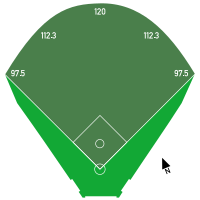Meiji Jingu Stadium
- View a machine-translated version of the Japanese article.
- Machine translation, like DeepL or Google Translate, is a useful starting point for translations, but translators must revise errors as necessary and confirm that the translation is accurate, rather than simply copy-pasting machine-translated text into the English Wikipedia.
- Consider adding a topic to this template: there are already 3,690 articles in the main category, and specifying
|topic=will aid in categorization. - Do not translate text that appears unreliable or low-quality. If possible, verify the text with references provided in the foreign-language article.
- You must provide copyright attribution in the edit summary accompanying your translation by providing an interlanguage link to the source of your translation. A model attribution edit summary is
Content in this edit is translated from the existing Japanese Wikipedia article at [[:ja:明治神宮野球場]]; see its history for attribution. - You may also add the template
{{Translated|ja|明治神宮野球場}}to the talk page. - For more guidance, see Wikipedia:Translation.
 JB at Sendagaya and Shinanomachi
JB at Sendagaya and Shinanomachi G at Gaiemmae
G at Gaiemmae E at Kokuritsu-Kyogijo
E at Kokuritsu-Kyogijo
Left-Center – 112.3 metres (368 ft)
Center Field – 120 metres (394 ft)
Right-Center – 112.3 metres (368 ft)
Right Field – 97.5 metres (320 ft)
Height of outfield fence – 3.5 m (11.5 ft)

Tohto University Baseball League (1932-current)
Tokyo Yakult Swallows (Central League) (1964-current)
The Meiji Jingu Stadium (明治神宮野球場, Meiji Jingū Yakyūjō) is a baseball stadium in Shinjuku, Tokyo, Japan. It opened in 1926 and holds 37,933 spectators. Property of the Meiji Shrine, it is the home field of the Tokyo Yakult Swallows professional baseball team. It also hosts college baseball, including the Tokyo Big6 Baseball League and the Tohto University Baseball League.
Redevelopment plans call for the stadium and the adjacent Chichibunomiya Rugby Stadium to be demolished and replaced with new facilities.
History

As the second-oldest baseball stadium in Japan, Meiji Jingu Stadium is one of the few professional stadiums still in existence where Babe Ruth played (the only other ones are Wrigley Field in Chicago, Fenway Park in Boston, and Koshien Stadium in Hyōgo Prefecture, Japan). In 1934, Ruth joined several other famous baseball players from the U.S., such as Lou Gehrig and Jimmie Foxx, in a 22-game tour of Japan. Matsutarō Shōriki, popularly known as the father of Japanese professional baseball, organized the American tour; he survived an assassination attempt for allowing foreigners to play baseball in Jingu Stadium.[3] He received a 16-inch-long wound from a broadsword during the assassination attempt.
In 1964, the Tokyo Yakult Swallows moved into Meiji Jingu Stadium, replacing Korakuen Stadium, majorly because the Yomiuri Giants and the then named Toei Flyers (now Hokkaido Nippon-Ham Fighters), also called Korakuen home, which made it quite overcrowded with teams. They have stayed there since.
The stadium was also used for an exhibition of baseball when Tokyo hosted the 1964 Summer Olympics. The United States team of college baseball players, including eight future major league players, defeated a Japanese amateur all-star team, 6–2.
In 2019, the Meiji Jingu Gaien, the Japan Sports Council, Mitsui Fudosan and Itochu Corp. groups agreed to redevelop both Meiji Jingu Stadium and the Chichibunomiya Rugby Stadium. Under the plans, Meiji Jingu Stadium will be demolished and rebuilt on the site of the rugby ground.[4] The replacement rugby stadium will be built on the current site of the Meiji Jingu Stadium Number 2 field. Officials have announced that the new stadium will have a roof over the field and stands.[5]
In popular culture
Meiji Jingu Stadium makes frequent appearances in baseball-themed manga and anime, including the series Ace of Diamond and Gurazeni. The latter features the stadium's fictional home team, the "Jingu Spiders".
Meiji Jingu Stadium is mentioned in the 1937 novel How Do You Live? by Genzaburo Yoshino. The stadium is also featured in the short story The Yakult Swallows Poetry Collection by Japanese writer Haruki Murakami, from the 2020 short story collection First Person Singular.[6]
Nogizaka46 considers Meiji Jingu Stadium their home field. Since 2014, they have visited it every year during their National Summer Tour, with the exception of 2021.[7]
Meiji Jingu Stadium appears in Season 2 Episode 8 of the Love Live! Superstar!! anime. It is briefly considered for Liella!'s performance; however, their attempt to use the space is denied. Neighboring Japan National Stadium appears in Season 2 Episode 11 under the similar but fictional name "Jingu Stadium".
References
- ^ "Hibrid Turf in Jingu Stadium".
- ^ "Watching Baseball in Tokyo: How to See a Game at Jingu Stadium | Tokyo Cheapo".
- ^ "Matsutaro Shoriki: Japan's Citizen Kane," The Economist (Dec 22, 2012).
- ^ "Olympics: Tokyo's iconic baseball, rugby fields set for redevelopment". Kyodo News. 28 February 2019. Retrieved 8 May 2020.
- ^ "Officials choose dome for new Prince Chichibu rugby stadium". The Asahi Shimbun. 25 December 2020. Retrieved 18 May 2021.
- ^ Cheuk, Leland (12 April 2021). "Haruki Murakami's 'First Person Singular' will satisfy fans with its uncanny scenarios". The Washington Post. Retrieved 20 April 2021.
- ^ "「真夏の全国ツアー2022」開催決定!ラストは明治神宮野球場!" [Midsummer National Tour 2022 Announced! The last is Meiji Jingu Baseball Stadium!]. Nogizaka46. Sony Music Entertainment Japan. 15 May 2022. Retrieved 15 May 2022.
External links
- Meiji Jingu Stadium(Japanese)
| Preceded by | Home of the Toei Flyers 1962 – 1963 | Succeeded by |
| Preceded by | Home of the Tokyo Yakult Swallows 1964 – | Succeeded by N/A |














